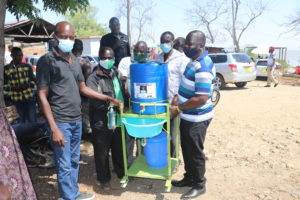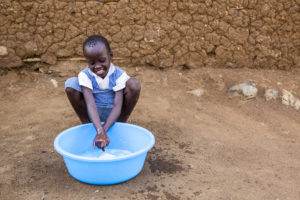We have never been reminded so regularly to wash our hands. The UK Government’s ‘hands, face, space’ messaging is repeated everywhere we go. And similar messaging is found all over the world.
For most of us, it is fairly straightforward to stick to the rules. We just have to remember, but we are in easy reach of a basin with running water and soap. Sadly, the same is not true in many places around the world. The most recent global figures from UNICEF and WHO show that 3 billion people still lack access to a handwashing facility with soap and water. Schools and health care settings also lack this basic provision. In low-income countries in 2019, 4 in 5 schools did not have access to handwashing facilities with soap and water.
The results of this lack of provision are devastating. Estimates are that 1.4 million children die before the age of 5 from diarrhea and pneumonia. Overall it’s estimated that 230,000 lives could be saved each year through handwashing.

An example of a non-touch handwashing station
The covid-19 pandemic has shone a harsh light on these realities. It is also an opportunity to kick-start a ‘new normal’ where far more people are able to wash their hands regularly, and have developed new habits that will be sustained into the future.
Achieving this will take action on many fronts.
Giving this the finances it deserves is one. The global partnership Sanitation and Water for All partnership, for example, is taking the call to Finance Ministers meeting over the coming months. Globally, far too little of the money invested in water and sanitation goes to promoting hygiene, despite the high returns it can bring. Some evidence suggests that a $3.35 investment in handwashing promotion could bring the same health benefits as $11 invested in latrine construction or $200 invested in household water supply.
Other actions involve mobilizing with local communities to create ingenious solutions at the local level. Over the last few months Practical Action has been working hard for this ‘new normal’ around the world.
In Kenya, our work in Kisumu has included communication campaigns with simple messaging translated into local languages and displayed on walls and other public spaces.
We have also helped with the design and installation of hundreds of non-touch handwashing stations in public place, health facilities, and at transport hubs.

A Safe Pair of Hands project work in Kisumu
We understand the value of starting early. Our ‘Safe Pair of Hands’ work improving the situation for children under 5 has shown us that policies, health promotion and facilities all need to be better geared for this age group.
Our new policy brief calls for lasting changes that will help overcome the existing barriers to handwashing among young children. It highlights how standard hygiene messaging can be ineffective for under-fives, and how early childhood centres are not always able to prioritise handwashing facilities are practices. We gather together some of the best suggestions for child-friendly handwashing stations, and the visual and other ‘nudges’ that can help make handwashing a habit for life.
In Bangladesh, we have focused on the needs of frontline workers – the informal sector who have been at the forefront of keeping services running. Our work showed how many of these workers lack adequate safety equipment, or a place to wash their hands during their working day. We have worked with a national association of waste and sanitation workers to share messages about how to stay safe during the pandemic, and to celebrate the service that these women and men provide in keeping others healthy and safe.
As the pandemic and safety measures continue to affect our lives, we have all had to change our lives in one way or another. Many of us have had to adopt new habits to go about our daily lives. So on Global Handwashing Day, let’s commit to making it possible for everyone to wash their hands with soap whenever they need to. That would be a new ‘normal’ that is #anythingbutnormal.